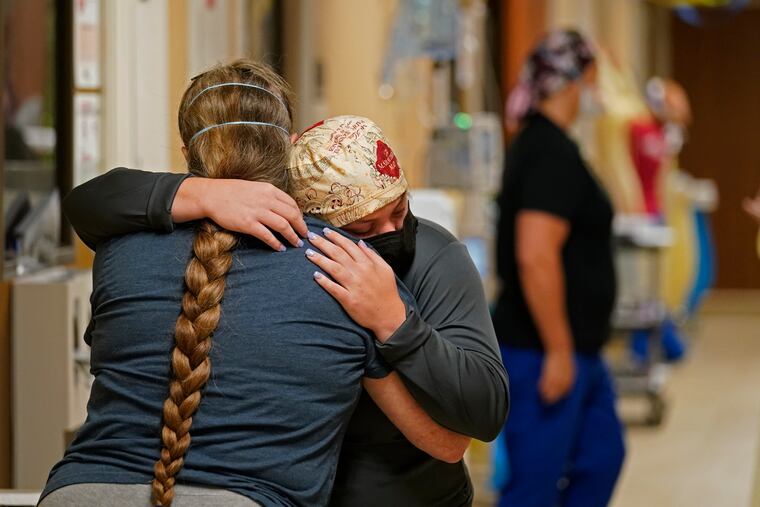My first COVID patient died in March 2020, and I can’t stop thinking about it | Opinion
With health-care workers exhausted and anxious, a registered nurse writes about the importance of supporting a new bill to bolster the mental health of medical professionals.

Even though March 2020 was almost two years ago now, I still replay what happened when my first COVID-19 patient died. He was only 31 years old.
At first, he was doing OK. Then I heard the sound every nurse dreads: The “beep-beep-beep, beep-beep-beep” of the bedside alarm, signaling something was wrong.
I ran over, but since I wasn’t in all my protective gear, I could only look at him through the glass door and read his stats. His oxygen saturation — the measure of how much oxygen was in his body — was low again, 87% and dropping. (Anything under 90% is considered low.) I yelled “Breathe!” through the glass door. “In through your nose, out through your mouth!”
He looked at me, scared and anxious. I quickly called the respiratory team and threw on my gown, N95 mask, surgical mask on top, goggles, face shield, and two pairs of gloves. My heart was racing, and I felt a slight tremor go through my hands. Try to stay calm, I told myself. I entered the room.
My patient, who was already getting the maximum dose of high-flow oxygen, was now down to 83% oxygen saturation. He told me he couldn’t breathe. I call for help, and doctors flood the outside of the door, all of them looking in.
“We are going to have to intubate!” I heard one of them yell. My patient looked up at me, starting to cry. “Tell my family I love them,” he said. “It’s going to be OK,” I reassured him. Those were the only words that I thought of at the time, but I didn’t know if they were true.
He died days later.
Nearly two years later, I am still asking myself: What could we have done differently? Was there something to prevent it? He was so young and did not have any medical issues. Why did this happen?
“Nearly two years later, I am still asking myself: What could we have done differently? Was there something to prevent it? He was so young and did not have any medical issues. Why did this happen?”
Little did I know what the next year and a half was going to bring: More COVID-19 patients dying in front of me, more questions, and no good answers.
Over the last several months, I realized my mental health has been declining. I have been getting anxious over trivial things happening in my personal life and at work. In speaking with my coworkers and reading stories from other nurses around the world, I learned that I was not alone; medical professionals everywhere are experiencing similar mental health issues brought on by this pandemic. A survey found that 76% of health-care workers were burned out and exhausted in September 2020; imagine how they feel now.
» READ MORE: As pressure from the pandemic wanes, health-care workers cope with burnout and a fractured community
The Pennsylvania General Assembly is working to pass a bill (HB 1420) that would establish a public awareness campaign about the mental health of “Healthcare Heroes.” If signed into law, this bill will provide information regarding services and programs that are available to support first responders, health-care workers, and other frontline workers and their families who are experiencing such issues as anxiety, depression, post-traumatic stress disorder, and substance use disorder.
These heroes have put their lives at risk while caring for others. They are struggling and suffering. They deserve to be made aware of the kinds of programs and services that are available to support them.
The mental health of health-care workers matters to all of us, particularly when you consider that 30% of health-care workers say they are thinking about quitting, in part due to burnout. Since March 2020, we have watched as people die despite our continuous efforts to keep them alive. We have dealt with personal protective equipment shortages, short staffing, continuously changing CDC and local health guidelines and protocols, and living in constant fear of getting the virus ourselves and bringing it home to our families and loved ones. More than 100,000 of us have died worldwide, trying to save everybody else.
And this pandemic is far from over.
By rallying behind this bill, you can help the people who have selflessly and continuously helped all of us. Those who have worked and continue to work during this unprecedented time not because they want to work, but because they are the committed caretakers and ambassadors of life. Their mental health matters.
Danielle Thomas is a registered nurse and a student at the University of Pennsylvania School of Nursing’s MSN family nurse practitioner program.